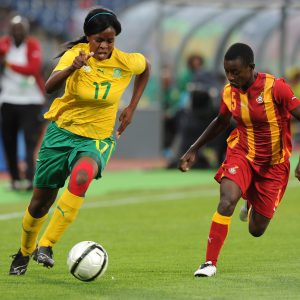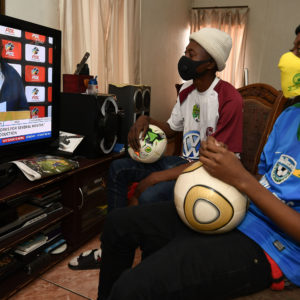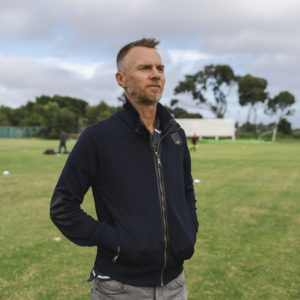David Obua’s South African legacy
The Ugandan footballer paved the way for his countrymen when his skills on the pitch got Kaizer Chiefs and Orlando Pirates vying to sign him in the mid-2000s.
Author:
13 May 2022

David Obua’s legacy in South Africa goes beyond what he did on the pitch for Kaizer Chiefs. The Ugandan paved the way for his compatriots such as Posnet Omony, Timothy Batabaire (Bloemfontein Celtic), Denis Onyango (SuperSport United) and Geofrey Massa (Jomo Cosmos) to follow suit in signing for top-flight clubs in the country.
Sporting a trademark cornrow hairstyle, Obua established himself as an irreplaceable and versatile wingback before the term became a staple in the South African football lexicon. He played both in defence and offensively on the left flank, and even had a cameo in goal for his beloved Chiefs. But he almost joined their bitter rivals Orlando Pirates in 2005.
The two Soweto giants’ pursuit of the Ugandan started right after he had dished up a stellar performance for the Cranes in their 2-1 loss to Bafana Bafana, at FNB Stadium on 26 March 2005, in the qualifiers for both the 2006 Africa Cup of Nations (Afcon) and the Fifa World Cup. Obua capped his good performance with a goal, but it wasn’t enough to get the Cranes past Bafana.
Related article:
“There were offers put on the table,” Obua said from his home in Kampala. “It was crazy… Pirates were aggressive. They were like, ‘We have the contract copy here, you sign we give you this money. I said no, I have just played the game. I am tired. I had to go back upstairs in my room because these guys were calling. The coach [for Uganda] was Mohamed Abbas, an Egyptian, so he told me: ‘David, go up in your room and lock yourself up. If these people need you, they will find you in Uganda.’”
Chiefs won the signature of the then 21-year-old after their agent Ivica Stankovic followed him to Kampala to make a passionate plea to the player and his club Express FC. “When I came back [home], I zeroed in on Kaizer Chiefs because of what they had told me about the club, that it was the most supported club. They told me many good things about the club, about Chincha, the president of the club Kaizer Motaung. I naturally loved the club. Up to now, it is my favourite club. I shall die in gold and black,” he said.
“We sat down with Stankovic and we spoke. I think that is what made me want to go for Kaizer Chiefs, because they pursued me more. For the Pirates’ side, they wanted the contract signed in the hotel but I said, no, no. Ivica came to Uganda the following weekend. We sat with him, we spoke, he had to speak to the president of my club, they spoke, they came to an agreement, they paid what they had to pay and then I was a Kaizer Chiefs player.”
The path to Europe
Obua’s time at Chiefs came after a bad experience at AS Port-Louis FC in Mauritius, where he played before returning home to join Express FC. His career actually started at Police FC in Uganda in 1999, before he got a scholarship in the United States to pursue his tertiary education. The conditions of that scholarship included not venturing into professional football, but because Obua was so determined to become a professional footballer, he ended up signing for Raleigh Capital Express and then the Wilmington Hammerheads in 2001.
He returned home to join Express that same year, before going to Port-Louis in 2002. “I went there because the president had told me it [the country] is like a French colony, so if I play well there I could go to France. I thought that by going there I would have that opportunity to be scouted by a French team, but it was a bit difficult,” Obua said.
What he realised when he got there was that the president had oversold the league. “It wasn’t professional. It was extremely semi-professional, whereby the players worked during the day and came at night for training. We trained at night at around 7pm and 8pm. It was mentally mind-boggling because I was doing nothing during the day. It was mentally torturing me, so I wasn’t able to stay for long,” the former Cranes captain said.
Related article:
So when Chiefs came knocking after he had returned to Express, Obua said he was determined to grab the opportunity with both hands, make a name in South Africa and realise his dream of playing in Europe.
“Situations like that help shape your mentality. When I came to Kaizer Chiefs, I came with a very aggressive mentality. If you saw me playing during my first game with Kaizer Chiefs, I was extremely aggressive because my objective was to play for Kaizer Chiefs with all my heart and go to Europe,” Obua said.
“My memorable games were mostly against Pirates because I was told: ‘We can lose the league but we can’t lose a game against Pirates.’ So every time I played against them, I was like a lion. I was lucky that I scored in most derbies.”
Scottish folklore
At Chiefs, coach Ernst Middendorp made him play in different positions in addition to the striker-cum-leftwinger roles to which he had become accustomed. “Middendorp, who had a good influence on me, explained to me what he wanted me to do. At that time, tactically, I was good. I could understand. He told me: ‘I want you to play as a leftback but because you will not be defending that much, you will be attacking most of the time. Tinashe Nengomasha will cover you, so make sure that when we get the ball, I want you to run forward.”
Obua also played a key role for Chiefs as they won the Absa Cup and SAA Supa 8 in 2006, which saw him named as the club’s Player of the Season for 2005-2006. He left after three years in 2008 to join Scottish outfit Heart of Midlothian.
“The first shock I got was the weather. It was extremely cold. I had been in South Africa for three years, so I had to adapt to something totally different. That is why a lot of players [from Africa] have to gradually be moved to Europe because it is not a place where you just go and shine,” he said.
Related article:
There were times when Obua felt like returning home, but he kept reminding himself that giving up was not in his DNA. Media reports show that Obua struggled to adjust to life in Scotland at Hearts under manager Csaba Laszlo. His fortunes changed when Jim Jefferies took over, but Obua found himself being played as a lone forward, a position he was not used to.
The man who was born to a family of six children was still able to write his name notably in Hearts folklore, after he scored the winner against Hibernian in the Edinburgh derby. Obua left Hearts at the end of his contract in 2012 and started taking coaching courses, after getting help from friends such as South African legend Benni McCarthy, who linked him up with the Irish football federation.
Three years later, Obua called time on his playing career to venture into coaching at home in Uganda, where he is the assistant coach at Premier League side Maroons FC. He now holds a Uefa A Licence and is determined to contribute to football development in Uganda.



